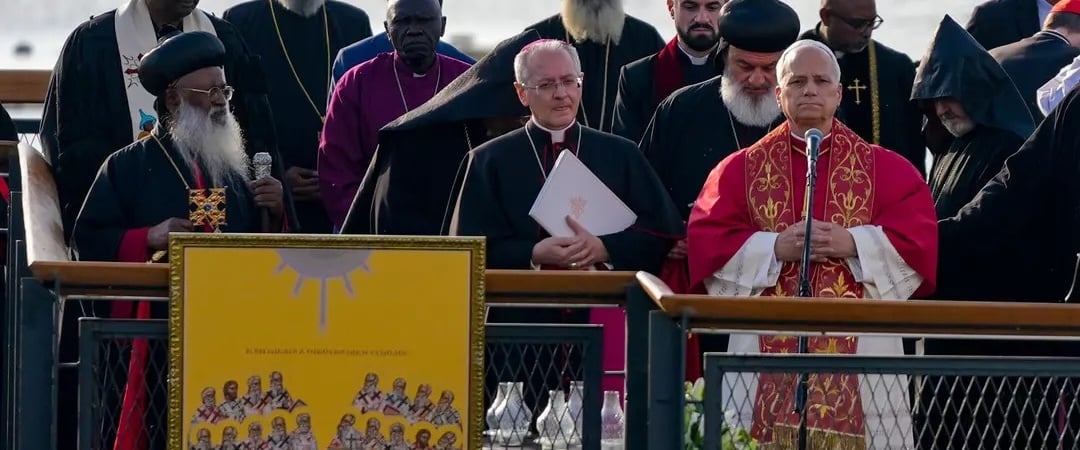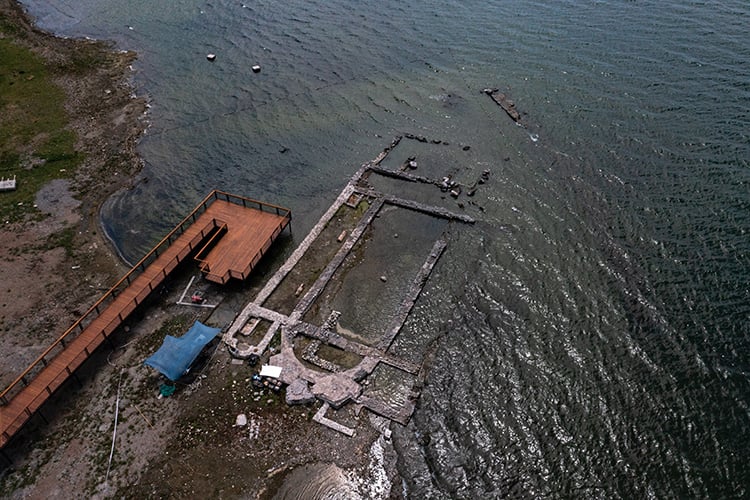Historic Prayer in Iznik After 1700 Years: A Message of Unity and Peace


The previous visit by the Pope to Turkey was made by Pope Francis in 2014. After Pope Francis' death on April 21, 2025, Pope Leo XIV, elected on May 8, 2025, as the 267th Head of the Vatican State and the Catholic Church, made his first official trip abroad to Turkey on Thursday, November 27.
The Pope met with President Tayyip Erdoğan in Ankara and arrived in Istanbul that same evening. On November 28, the Pope held a “Prayer Meeting with Bishops, Priests, Deacons, Consecrated Persons, and Pastoral Workers” at the Holy Spirit - Saint Esprit Cathedral in Şişli, and then visited the French Hospice in Bomonti. Following this visit, he held a private meeting with Chief Rabbi Rav Davit of Turkey.
After his engagements in Istanbul, the Pope flew by helicopter to the district of Iznik in Bursa at noon and celebrated the eagerly awaited 1700th anniversary of the First Council of Nicaea.
Pope Leo XIV was welcomed in Iznik by Ecumenical Patriarch Bartholomew of Constantinople, Patriarch Mor Ignatius II Afrem Karim of Antioch and All the East, Patriarch Sahak Mashalyan of the Armenian Church in Turkey, Patriarch Mor Ignatius Joseph III Younan of the Syriac Catholic Church, and numerous other religious leaders.
Marking the 1700th anniversary of the First Council of Nicaea, which convened in 325, all the patriarchs and clergy gathered together, as in history, and delivered a message of "unity."
On a platform set up near the archaeological excavations of the ancient Basilica of Saint Neophytos, the Pope and all the clergy proceeded, accompanied by hymns. A choir also accompanied the clergy, singing hymns.
The Pope and 20 clergy lit candles before icons of Jesus Christ and the Council. Pope Leo XIV delivered a speech here.
The Full Text of the Pope's Speech:
"Dear brothers and sisters, in a historical period marked by countless elements threatening human dignity and many tragic signs, today, the 1700th anniversary of the First Council of Nicaea offers a valuable opportunity to rediscover the presence of Jesus Christ in the lives of women and men and to ask ourselves who Jesus is for each of us personally. This question is of particular importance for Christians who risk reducing Jesus Christ to a kind of charismatic leader or superhero, because such a reduction leads to a distortion that causes sorrow and confusion (cf. Leo XIV, Sermon, Pro Ecclesia Mass, May 9, 2025). Arius, who denied the divinity of Jesus Christ, disregarded the reality of the Incarnation and reduced Him to merely a mediator between God and humanity, thus irrevocably separating the divine from the human. If God did not become human, how can mortal creatures share in His immortal life? What is at stake in Nicaea—and today—is our faith in God, who became like us in Jesus Christ, to make us “partakers of the divine nature” (2 Peter 1:4; see also St. Irenaeus, Adversus Haereses, 3,19; St. Athanasius, De Incarnatione, 54,3).
This Christological confession of faith is of fundamental importance in the journey of Christians towards full unity. For this confession is shared by all Christian churches and communities throughout the world, including those who, for various reasons, do not use the Nicene-Constantinopolitan Creed. Indeed, ‘One Lord Jesus Christ, the only-begotten Son of God, begotten of the Father before all ages... of one substance with the Father’ (Nicene Creed) is already a powerful bond that deeply unites all Christians. In this sense, we can echo the words of St. Augustine: 'Though we Christians are many, we are one in the one Christ.' (Commentary on Psalm 127) Therefore, conscious that we are already bound to one another by such a deep bond, we can continue our journey with ever deeper devotion to the Word of God revealed in Jesus Christ, guided by the Holy Spirit, in mutual love and dialogue.
Thus, we are all invited to overcome the pain caused by divisions that unfortunately still exist and to nurture the longing we feel for the unity for which the Lord Jesus prayed and gave his life. The more we live in peace and harmony, the more reliably we Christians can proclaim the Gospel of Jesus Christ—a message of hope for everyone. Moreover, this message is a call for peace and brotherhood that transcends the boundaries of our communities and nations (See Francis, Address to Participants in the Plenary Assembly of the Pontifical Council for Promoting Christian Unity, May 6, 2022).
We Profess Our Faith as Stated in the Nicene Creed

Today, all humanity, wounded by violence and conflict, cries out for peace and reconciliation. The desire for full unity among all who believe in Jesus Christ is always accompanied by the search for brotherhood among all humanity. We profess our faith in the Nicene Creed, “in one God, the Father.” However, as long as we refuse to accept all other men and women, created in God's image, as our brothers and sisters, we cannot call God our Father (cf. Second Vatican Council, Nostra Aetate, 5). There is a universal brotherhood of women and men, without distinction of race, nationality, religion, or personal opinion. Religions, by their very nature, are rich sources that hold this truth; therefore, they should encourage individuals, groups, and peoples to recognize and put it into practice (See XIV. Leo, Closing Address at the Prayer Meeting for Peace, October 28, 2025).
Furthermore, we must categorically reject the use of religion to justify war, violence, or any form of fundamentalism or fanaticism. The paths to follow are those of fraternal encounter, dialogue, and cooperation. On the occasion of the 1700th anniversary of the Council of Nicaea, I am deeply grateful to His All-Holiness Patriarch Bartholomew, who, with great wisdom and foresight, decided to commemorate this event together on the very soil where the Council was held. I also sincerely thank the church leaders and representatives of the Christian World Alliance who accepted our invitation to participate in this event. May God the Father, who is all-powerful and merciful, hear the heartfelt prayers we offer to him today and ensure that this important anniversary bears abundant fruit in reconciliation, unity, and peace."
Following the text, all the patriarchs and clergy offered prayers in Italian, Armenian, Syriac, and Arabic.
After the 40 minute ceremony, the Pope visited the Basilica of Iznik Lake Archaeological Site and accepted the gifts presented to him.
Pope Leo XIV then set off for Istanbul, where he will hold a series of visits tomorrow, including a public ceremony at the Volkswagen Arena.



